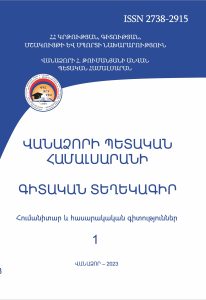The Influence of Locus of Control in the Choice
Scientific Proceedings of Vanadzor State University Humanitarian and Social Sciences (ISSN 2738-2915)
2023 vol 1
The Influence of Locus of Control in the Choice of Coping Strategies for Teachers
Hayk Avagimyan
Anahit Stepanyan
Summary
 Key words: strategy of coping and self-control, internal external processes, stress, coping behavior, coping resources, coping mechanisms
Key words: strategy of coping and self-control, internal external processes, stress, coping behavior, coping resources, coping mechanisms
The article discusses the theoretical approaches of coping, coping behavior, coping strategies and locus of control. A brief theoretical analysis of the theory of coping, the components of coping strategies, the definition and role of locus of control is presented.
In the context of the modernization of education and the intensive search for new technologies in educational practice, the issue of maintaining the psychological health of a school teacher becomes a matter of extreme importance. There is a positive relationship between the presence of certain coping strategies and the degree of emotional burnout of teachers, namely, teachers with a formed phase of emotional burnout are dominated by non-adaptive coping strategies, while teachers with an unformed phase of emotional burnout are dominated by non-adaptive coping strategies. Also the article presents the data of our empirical study and their analysis based on a sample of teachers, in which the dependence of coping strategies on the locus of control was revealed. The nature and method of overcoming stressful situations is a special category of resources for stress resistance and coping techniques, which includes strategies and models of coping behavior or coping strategies. The preconditions for the formation of a burnout syndrome, requires the use of unproductive coping mechanisms, such as the non-adaptive mental processes and unproductive emotional and behavioral responses.
We revealed significant relationships between coping strategies in problem solving and two scales of subjective control: internalization and general internalizing attitudes towards health and illness, as well as an inverse relationship between problem avoidance coping strategies and internalization of achievements.
Based on the semantic meaning of the locus of control in the theory of J. Rotter and the coping strategy in the interpretation of D. Amirkhan, it can be assumed that the locus of control is a more fundamental personal characteristic than the strategy of coping behavior itself, and it is the locus of control that influences the choice of strategy.
